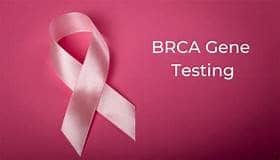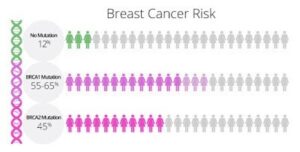Most women who are diagnosed with breast cancer did not inherit a genetic mutation linked to breast cancer and have no family history of the disease. However, for some individuals, understanding their genetic risk can be a crucial step in managing their health. The BRCA gene test, which identifies mutations in the BRCA1 and BRCA2 genes, is a powerful tool for assessing breast and ovarian cancer risk. Here’s what you need to know about BRCA gene testing.
Who Should Consider BRCA Gene Testing?
BRCA gene testing is typically recommended for individuals with a higher likelihood of having an inherited gene mutation that increases the risk of breast and ovarian cancers. You may be a candidate for genetic testing if you:
- Have blood relatives (e.g., mother, sisters, aunts) who were diagnosed with breast cancer before age 50.
- Have a family history of both breast and ovarian cancer or if both cancers occurred in a single individual.
- Have a relative with triple-negative breast cancer.
- Have a family history of other cancers, such as prostate, melanoma, pancreatic, stomach, uterine, thyroid, colon, and/or sarcoma.
- Have a history of cancer in both breasts among women in your family.
- Have a male family member who had breast cancer.
- Know of a known abnormal breast cancer gene in your family.
- Have a personal history of breast cancer diagnosed before age 45.
- Have a personal history of breast cancer diagnosed before age 50, along with other relatives with breast cancer or an unknown family medical history.
- Have a personal history of triple-negative breast cancer diagnosed at age 60 or younger.
- Have a personal history of prostate or pancreatic cancer, with two or more relatives with BRCA-associated cancers.

Understanding the Test Results
After undergoing BRCA gene testing, you can expect one of three results: positive, negative, or uncertain.
- A positive result indicates the presence of a mutation in either the BRCA1 or BRCA2 gene, significantly increasing your risk of developing breast or ovarian cancer compared to those without the mutation.
- A negative result means no BRCA gene mutation was found. However, it’s important to note that a negative test result does not guarantee you won’t develop breast cancer. Your risk remains similar to that of the general population.
- An uncertain result suggests the need for further evaluation and additional testing.
What’s Next After a Positive Result?
If you receive a positive BRCA gene test result, there are several steps you can take to manage your cancer risk. These may include tailored screening protocols and potential procedures or medications to reduce your risk. The path you choose will depend on various factors, including your age, medical history, and personal preferences.
It’s essential to understand that appropriate measures taken after a positive gene test can significantly reduce your risk, potentially lowering it from over 80% to less than 5%. This proactive approach can help you and your family avoid a potentially traumatic future and provide you with the assurance of a healthy and happy life ahead.
In conclusion, BRCA gene testing is a valuable tool for assessing breast and ovarian cancer risk, particularly for individuals with a family history or specific risk factors. Knowing your genetic risk can empower you to make informed decisions about your health and potentially take steps to reduce your cancer risk. If you meet the criteria for BRCA gene testing, it’s a crucial step to consider for a healthier future.







